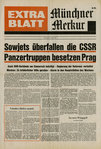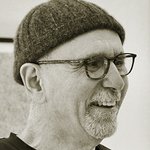

The train pulled into the Hauptbahnhof, Munich’s central station, just before noon. It was Wednesday, Aug. 21, 1968, a balmy day under a deep-blue sky, and I was on the first leg of my slow, back-roads way from Greece to Chicago, where I would be starting college in the fall. I had decided to take the scenic route: by train from Athens to Paris via Munich, on to London to visit family, then by bus from London down to the port of Southampton. There I would board the M/S Aurelia, a small but sleek liner chartered by the Council of Student Travel to ferry students across the Atlantic between Southampton and New York. From there, I would catch a TWA flight to Chicago.
But on that sunny day at the Hauptbahnhof all of that lay in the future. The first thing I needed to do before getting on the connecting train to Paris was wire my parents that I had made it safely, as they had made me promise. As I looked for the telegraph office, I passed a newsstand where a small crowd was gathered, staring in silence at the half-page headline in a special edition of the Münchner Merkur, the city’s daily: “Sowjets überfallen die CSSR/Panzertruppen besetzen Prag” (“Soviets invade Czechoslovakia/Tank troops occupy Prague.”). I picked up a copy.
We knew that was coming. The government of Alexander Dubček in Czechoslovakia, then in the sphere of the U.S.S.R., had come to power earlier that year promising reform and offering a plan for democratic socialism, a program that Dubček later called “socialism with a human face.” That was not empty rhetoric: those reforms were slowly being implemented, leading to a period of liberalization that we knew as the Prague Spring.
The Soviet Union wasn’t about to allow a state on its side of the Iron Curtain to rock the boat. Reforms challenging the repressive totalitarianism of Soviet communist orthodoxy did not sit well with Moscow or, for that matter, the hardliners in Czechoslovakia. In the early morning hours of Aug. 21, Soviet tanks and troops from Poland, East Germany, Bulgaria and Hungary rolled into Prague. In a statement from the Soviet government’s official press agency Tass reported in the New York Times, Moscow claimed that the intervention had been carried out at the request of “party and Government leaders of the Czechoslovak Socialist Republic” and that “nobody will ever be allowed to wrest a single link from the community of Socialist states.”
Over 100 Czechs were killed in the first days of the invasion. A dream also died; Czechoslovakia’s seven-month experiment in a freer society was over. For many of us in our teens, that was yet another nail in the coffin of innocence. The violent racist response to the struggle for civil rights; the ever-escalating Vietnam war; the assassination in April of Martin Luther King and of Robert Kennedy almost exactly two months later; and, in Greece, the military coup that had overthrown the democratically elected government, installing a junta that would stay in power for seven years. Those were some of the watershed events that defined our coming of age. It was a world where the gap between ideals and reality was widening into a chasm that threatened to swallow our hopes
But we fought back.
I was due to land in Chicago Sept. 7, a week after the tumultuous Democratic National Convention was held in that city. The convention had sparked protests and violent clashes between Mayor Richard M. Daley’s police and thousands of people of my generation demanding an end to the Vietnam war. “The whole world is watching,” they chanted, as the police attacked them with tear gas and bludgeoned them with clubs and the butts of their guns. I was still in London while this was happening, glued to the television, slack-jawed and shaken but also rooting for the protesters. From Soviet tanks rolling into Prague to the violent attacks in Chicago: this trip was literally starting out with a bang.
The crossing from Southampton to New York on the seriously underpowered Aurelia, maximum speed 20 knots, lasted a full seven days, as I remember. Almost all the passengers were my age, most of them Americans returning home after a summer or a school year abroad. We had no access to the news, and in any case I was busy trying to adapt my very good classroom English to the real world, sometimes with hilarious results. A bottle of Greek ouzo intended for a relative in New York I had never met was consumed to the last drop one night. I haven’t gone near the stuff since.
About a day out of New York we came within AM radio range, and suddenly transistor radios were pulled out of backpacks and suitcases and tuned to a chorus of American stations. For many those were the sounds, the music and the words of home. I felt a bit left out, but I also had to pinch myself: this was it, I was in America and this was what America sounded like, even though for the most part I had no idea what the announcers or DJs were saying.
Then the next day, as we made our way into the bay and up the Hudson toward our assigned pier, there was Miss Liberty herself, made small by the distance, but we knew that was an illusion.
We all cheered. We were home.
Joseph Pentheroudakis is an artist, historian and avid birder who writes from Herron Island.
UNDERWRITTEN BY THE FUND FOR NONPROFIT NEWS (NEWSMATCH) AT THE MIAMI FOUNDATION, THE ANGEL GUILD, ADVERTISERS, DONORS AND PEOPLE WHO SUPPORT INDEPENDENT, NONPROFIT LOCAL NEWS